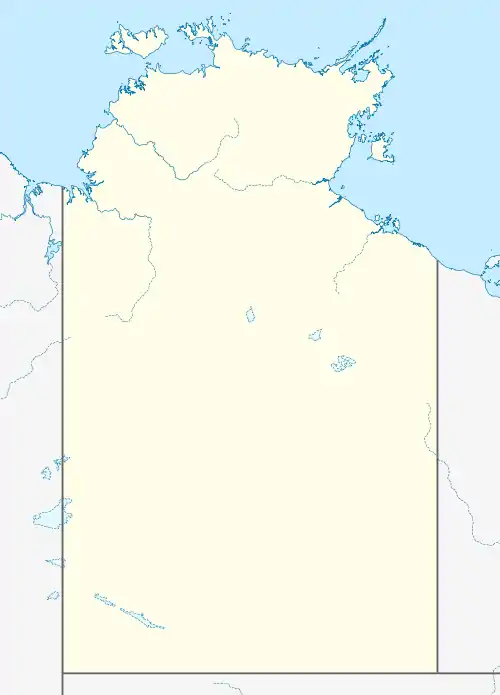Grove Hill, Northern Territory
Grove Hill, in the Northern Territory of Australia, was once a centre for mining operations. Today, only a hotel with a few outbuildings survive. Since 2007, it has been located in the localities of Burrundie and Douglas-Daly[1][2] The Adelaide–Darwin railway passes through Grove Hill.
| Grove Hill Burrundie & Douglas-Daly[1][2], Northern Territory | |
|---|---|
 Grove Hill | |
| Coordinates | 13°28′43″S 131°33′51″E[1] |
| Established | 1872 |
| Location |
|
History
Settlement of Grove Hill began after the discovery of gold by prospector Harry Roberts in 1872 during construction of the Overland Telegraph.[3] A stamping battery became operational on 6 June 1887 and was used to crush stone from surrounding mines.[4]
Grove Hill was formerly a siding on the North Australia Railway where a 2 ft gauge steam tramway some 12 miles in length was constructed in 1904 to connect the nearby Mount Ellison and Iron Blow mines met the main line, with a dual gauge section allowing main line wagons to be hauled to the private smelting works.[5][6] The Iron Blow mine, located 2 mi (3.2 km) south of the siding produced gold until its abandonment in 1914. The area surrounding the mine was surveyed by the Australian Government in 1960 after reports that there remained 33,000 tons of mineral ore available for extraction.[7]
Prior to 1935, a township and miners camp had thrived approximately 4 km (2.5 mi) south of the railway line. As the gold rush was ending, this settlement was abandoned and a hotel constructed near the railway sidings to take advantage of new business opportunities brought by travelers passing through the area.[8]
The remains of the settlement were further isolated in by the closure of the railway line in 1976 and was bypassed by the Stuart Highway when it was upgraded to National Highway standard between 1970–92, passing 15 km (9.3 mi), with the former road alignment now forming part of the Northern Goldfields Loop tourist drive.
Grove Hill Hotel

The Grove Hill Hotel was built in 1934 from materials scavenged from abandoned mining sites in the aftermath of the Great Depression. It has remained operating as a licensed hotel since and also incorporates a heritage museum with displaying historical artifacts from the local area. The hotel is renowned for birdwatching nearby.[9] It was listed for sale by auction on 12 July 2012 with a reserve price of $760,000, attracting widespread media coverage.[10]
In November 2016, after falling to attract a serious buyer, the hotel was closed.[11]
The hotel was listed in the Northern Territory Heritage Register on 2 November 1994.[2]
See also
References
- "Place Names Register Extract for "Grove Hill"". NT Place Names Register. Northern Territory Government. Retrieved 25 March 2019.
- "Grove Hill Hotel". Heritage Register. Northern Territory Government. 2 November 1994. Retrieved 18 May 2019.
3377 Stuart Highway, DOUGLAS-DALY
- Pike, Glenville. "The Northern Territory Overland Telegraph: An Epic of Courage - Just 100 Years Ago" (PDF). Royal Historical Society of Queensland. Retrieved 1 February 2014.
- http://nla.gov.au/nla.news-article47997047?searchTerm=Grove+Hill&searchLimits=
- http://www.lrrsa.org.au/Light%20railway%20locations%20in%20South%20Australia%20and%20Northern%20Territory%20etc.pdf
- http://nla.gov.au/nla.news-article4321977
- Bureau of Mineral Resources, Geology and Geophysics (1962). "Iron Blow Geophysical Survey, NT 1960" (PDF). Department of National Development (1950–1972). Retrieved 1 February 2014.
- Perry, Lorna (20 May 2009). "What remains of Grove Hill". Australian Broadcasting Corporation.
- "Pine Creek". Katherine Town Council. Archived from the original on 2 February 2014. Retrieved 1 February 2014.
- Askin, Pauline (12 July 2012). "Australian hotel for sale, snakes and crocs included". Reuters.
- https://www.theguardian.com/australia-news/2016/nov/03/last-drinks-at-the-grove-hill-hotel-how-we-farewelled-a-country-music-oasis